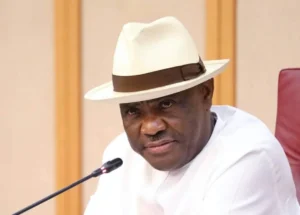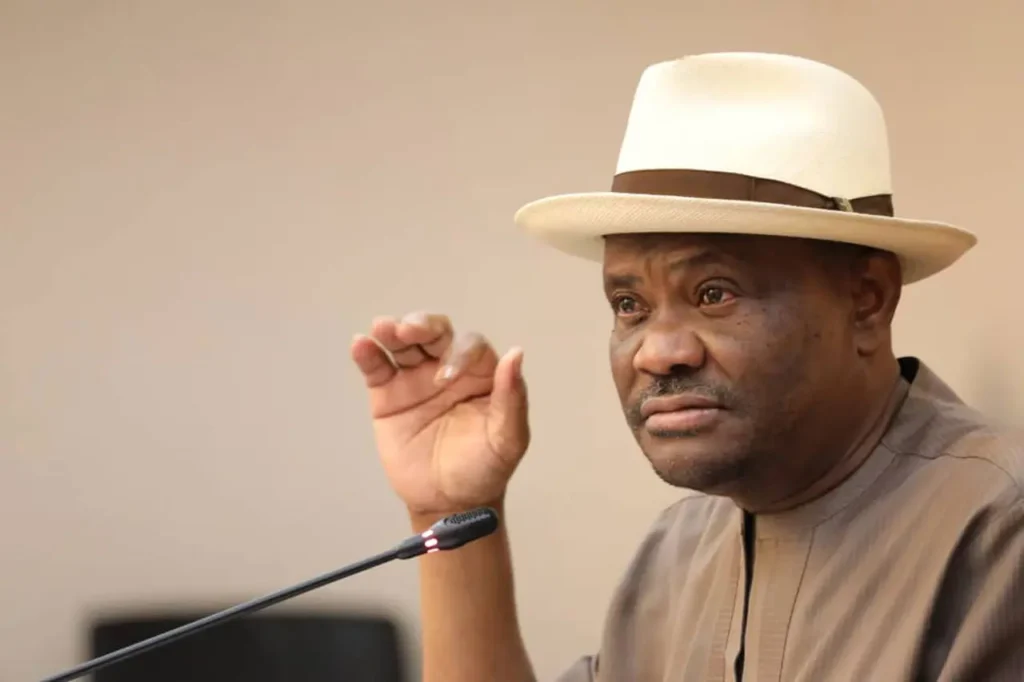A fresh wave of discord has rocked Nigeria’s main opposition party, the Peoples Democratic Party (PDP), following a dramatic move by Governor Nyesom Wike of Rivers State and his close allies to withdraw from the party’s presidential campaign council. This decision, driven by unresolved grievances over the party’s zoning arrangements, has intensified internal tensions and cast uncertainty over the PDP’s unity just months before the 2023 general elections.
Wike-Led Bloc Pulls Out of Atiku’s Campaign Structure
On February 1, 2023, key members of the PDP loyal to Governor Wike officially distanced themselves from the presidential campaign activities of the party’s flagbearer, Atiku Abubakar. The walkout included several governors and prominent figures known collectively as the “G-5” or “Integrity Group.” These include Governors Seyi Makinde (Oyo), Ifeanyi Ugwuanyi (Enugu), Samuel Ortom (Benue), and Okezie Ikpeazu (Abia), who, alongside Wike, have repeatedly demanded structural reforms within the party.
The group cited the PDP’s refusal to honor its internal zoning principle, which traditionally rotates party leadership positions and presidential candidacies between the North and South. At the heart of their protest is the insistence that the position of national chairman, currently held by Senator Iyorchia Ayu, a northerner, should be relinquished to the South to reflect regional balance since Atiku, also from the North, secured the presidential ticket.

Demands for Equity and Southern Representation
The Wike-led camp argued that allowing both the national chairmanship and the presidential ticket to remain in the North amounted to a betrayal of the party’s constitution and power-sharing tradition. They insist that such an arrangement marginalizes the South and contradicts the unity and fairness the PDP claims to uphold.
Efforts to reconcile the feuding factions failed, as party leadership remained firm on keeping Ayu in position until after the elections, prompting Wike and his allies to announce their withdrawal from campaign-related activities. The group clarified that while they remained PDP members, they could not in good conscience support Atiku’s bid without structural adjustments in the party.
Political Fallout and Electoral Implications
The exit of these influential governors and their allies has weakened the PDP’s campaign machinery in several key states, particularly in the South-South and South-East regions. Political analysts view the move as a significant setback for Atiku, who now faces the uphill task of securing nationwide support without the backing of critical party stakeholders.
Governor Wike’s deep pockets, strong grassroots structure in Rivers State, and public popularity make him a formidable force. His defiance has drawn sympathy from several southern leaders who feel the party has neglected their zone. Moreover, the governors aligned with him control significant voting blocs in their respective states, which could affect PDP’s performance in the upcoming polls.
A Divided Opposition Amid Fierce Competition
The internal conflict has raised concerns about PDP’s preparedness to present a united front against its main rival, the All Progressives Congress (APC), whose presidential candidate, Bola Ahmed Tinubu, is pushing hard to consolidate national support. The Labour Party’s Peter Obi, who has also gained momentum particularly among the youth and middle class, further complicates PDP’s prospects.
While Atiku has downplayed the crisis, expressing confidence in his ability to unite the party, observers warn that without urgent reconciliation efforts, the PDP risks a fragmented showing at the ballot.
Conclusion: Unresolved Tensions Ahead of the Polls
The fallout between Atiku and Wike’s camp remains one of the most high-profile political crises of the 2023 election cycle. With both sides digging in, the PDP’s internal rift continues to fester, creating doubts about its cohesion and strategic readiness for the presidential race.
Unless meaningful dialogue is reopened and concessions made, the absence of unity among the party’s top ranks could undermine PDP’s chances and reshape Nigeria’s political landscape in the coming weeks.







